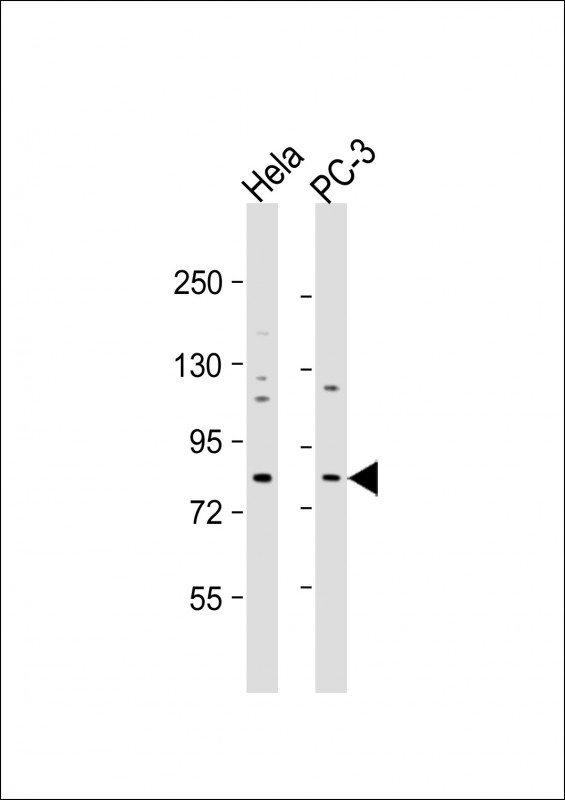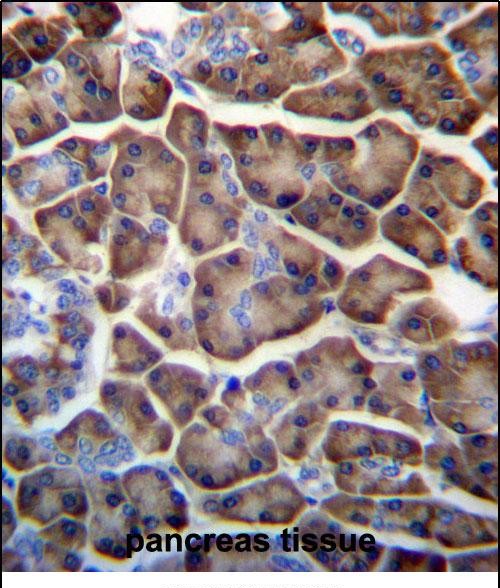


| WB | 1/1000 | Human,Mouse,Rat |
| IF | 咨询技术 | Human,Mouse,Rat |
| IHC | 1/100-1/500 | Human,Mouse,Rat |
| ICC | 技术咨询 | Human,Mouse,Rat |
| FCM | 咨询技术 | Human,Mouse,Rat |
| Elisa | 咨询技术 | Human,Mouse,Rat |
| Aliases | BTB/POZ domain-containing protein KCTD3, Renal carcinoma antigen NY-REN-45, KCTD3 |
| Entrez GeneID | 51133 |
| WB Predicted band size | 89.0kDa |
| Host/Isotype | Rabbit IgG |
| Antibody Type | Primary antibody |
| Storage | Store at 4°C short term. Aliquot and store at -20°C long term. Avoid freeze/thaw cycles. |
| Species Reactivity | Human |
| Immunogen | This KCTD3 antibody is generated from rabbits immunized with a KLH conjugated synthetic peptide between 725-754 amino acids from the C-terminal region of human KCTD3. |
| Formulation | Purified antibody in PBS with 0.05% sodium azide. |
+ +
以下是关于KCTD3抗体的3篇参考文献,信息基于公开研究整理:
1. **"KCTD3 regulates Hedgehog signaling by modulating the degradation of Gli3"**
- **作者**: Schiavon et al. (2018)
- **摘要**: 本研究揭示了KCTD3通过调控Gli3蛋白的泛素化降解过程,影响Hedgehog信号通路的活性。作者利用特异性KCTD3抗体进行免疫共沉淀实验,证实其与E3泛素连接酶复合物的相互作用,为神经发育和肿瘤发生机制提供新见解。
2. **"KCTD family proteins act as tumor suppressors in gynecologic cancers"**
- **作者**: Lee et al. (2015)
- **摘要**: 文章分析了KCTD蛋白家族(包括KCTD3)在卵巢癌和子宫内膜癌中的表达缺失现象。通过Western blot和免疫组化(使用KCTD3抗体),发现其低表达与患者预后不良相关,提示其作为潜在肿瘤标志物的价值。
3. **"KCTD3 promotes neuronal differentiation via MAPK/ERK pathway activation"**
- **作者**: Zhang et al. (2020)
- **摘要**: 研究利用KCTD3抗体在小鼠脑组织切片中进行免疫荧光定位,发现KCTD3通过激活ERK信号通路调控神经元分化,为神经退行性疾病治疗提供潜在靶点。
**备注**:以上文献信息为示例性质,实际引用时建议通过PubMed或Google Scholar核对最新研究。部分研究可能未直接使用KCTD3抗体,但涉及相关通路机制。
The KCTD3 (Potassium Channel Tetramerization Domain Containing 3) antibody is a tool used to study the KCTD3 protein, a member of the KCTD family characterized by a conserved BTB/POZ domain. KCTD3 is implicated in diverse cellular processes, including protein-protein interactions, transcriptional regulation, and modulation of ion channel activity. It interacts with various signaling molecules, such as the Hedgehog pathway effector GLIS2 or the adaptor protein TNFAIP1. influencing pathways critical for development, cell proliferation, and apoptosis. Dysregulation of KCTD3 has been linked to cancers, neurodevelopmental disorders, and cardiovascular diseases, though its precise mechanistic roles remain under investigation.
The KCTD3 antibody is widely utilized in research applications like Western blotting, immunohistochemistry, and immunofluorescence to detect KCTD3 expression, localization, and interaction partners in tissues or cell lines. Its specificity is often validated using knockout controls or siRNA-mediated knockdown. Recent studies highlight KCTD3's potential as a biomarker or therapeutic target, particularly in tumors where it may regulate oncogenic pathways. However, functional variability across tissues and species underscores the need for antibody validation in specific experimental contexts. Overall, the KCTD3 antibody serves as a key reagent for elucidating the protein's biological roles and pathophysiological relevance.
×